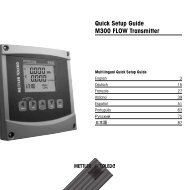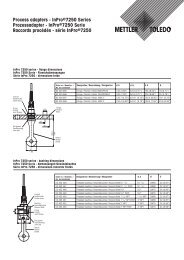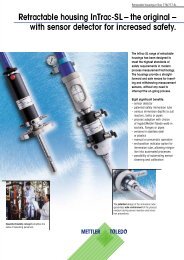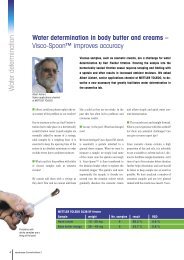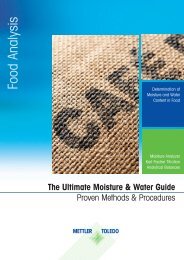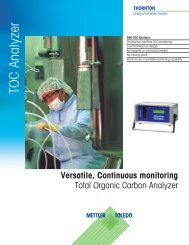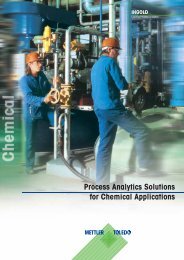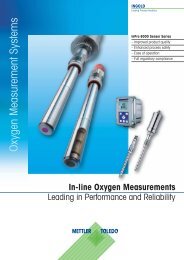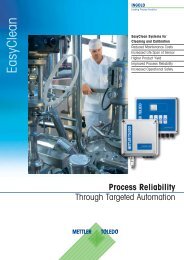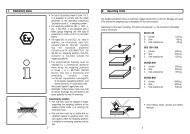White Paper – Enhancing Levels of Due Diligence - Mettler Toledo
White Paper – Enhancing Levels of Due Diligence - Mettler Toledo
White Paper – Enhancing Levels of Due Diligence - Mettler Toledo
You also want an ePaper? Increase the reach of your titles
YUMPU automatically turns print PDFs into web optimized ePapers that Google loves.
Vehicle Scales<br />
6 METTLER TOLEDO Newsletters 1/2012<br />
Serving the Palm Oil Industry<br />
Top Quality Vehicle Scales for Tropical Climate<br />
The tropical climate <strong>of</strong> Southeast Asia is humid and thunderstorms are common. Electronic<br />
components are prone to failure when left out in the elements due to moisture and frequent<br />
lightning. However, truck scales using the POWERCELL PDX ® load cell network have<br />
proven to be reliable in any environment, including Malaysia. Customers like palm oil producer<br />
Sime Darby are using this reliability to their advantage.<br />
Oil palm trees were first planted commercially<br />
in Malaysia in 1917 by William Sime<br />
and Henry Darby, founders <strong>of</strong> Sime Darby.<br />
Today, about 45% <strong>of</strong> the world’s palm oil is<br />
produced in Malaysia with Sime Darby being<br />
the largest palm oil producer in the<br />
world, producing over 2.4 million tons annually.<br />
Sime Darby Plantation operations<br />
include 42 oil mills in Malaysia and another<br />
23 mills in Indonesia. In total, the company<br />
manages over 530,000 hectares (1.3<br />
million acres) planted with oil palm trees.<br />
Oil palm trees require a tropical climate<br />
and are typically found within 20º <strong>of</strong> the<br />
equator. The oil palm fruit is made up <strong>of</strong><br />
an oily, fleshy outer layer and a single seed<br />
kernel. Roughly 22% <strong>of</strong> the fruit can be<br />
extracted as oil, producing significantly<br />
higher yields than other seed oils. The<br />
palm fruit is reddish and is typically 3<strong>–</strong>5 cm<br />
in length. It grows in large bunches referred<br />
to as fresh fruit bunches or FFB.<br />
Palm oil is reasonably priced and is high<br />
in natural antioxidants. It is a very com-<br />
Courtesy Malaysian Palm Oil Council<br />
mon cooking ingredient throughout<br />
Southeast Asia and the tropical belt <strong>of</strong><br />
Africa. In recent years, its use in commercial<br />
food processing applications has<br />
been growing around the world. There is<br />
also growing demand for palm oil in biodiesel<br />
as a source <strong>of</strong> renewable fuel.<br />
Producing palm oil<br />
Harvesting the FFB is a delicate process<br />
that requires highly skilled workers. The<br />
FFB grows high in the trees and weighs<br />
30<strong>–</strong>50 kg (65<strong>–</strong>110 lb) when ripe. They<br />
are cut with a blade on a long pole and<br />
fall as much as 20 m (60 feet) to the<br />
ground. It is critical to begin the milling<br />
process the same day the FFB is cut from<br />
the tree to preserve the quality <strong>of</strong> the oil.<br />
Free fatty acids begin to form in the FFB<br />
once it is cut. The acids, which degrade<br />
the quality <strong>of</strong> the oil, continue to rise<br />
within the FFB until it undergoes the<br />
steam sterilization process at the mill.<br />
Mills receive the FFB, extract the oil from<br />
the pulp <strong>of</strong> the fruit, and collect the ker-<br />
Palm fruit. Recently cut fresh fruit bunch (FFB). Refined palm oil.<br />
nels from the fruit center. The extracted<br />
oil is then sent to a refinery where the oil<br />
is further processed into edible oil. Sime<br />
Darby Plantation’s East Oil Mill on Carey<br />
Island is one <strong>of</strong> the company’s larger<br />
mills, producing 400 tons <strong>of</strong> oil per day.<br />
The mill has been steadily growing since<br />
it was opened in 1983. The mill currently<br />
has 109 employees working 3 shifts. They<br />
are continuously improving and automating<br />
their processes.<br />
The POWERCELL ® Advantage<br />
Vehicle weighing is an essential part <strong>of</strong><br />
the mill process. Fruit bunches are<br />
brought to the mill on trucks or tractorpulled<br />
wagons from all around the region.<br />
The loads are weighed for payment<br />
and inventory control. Once the oil is<br />
milled, it is put into large tankers that<br />
are weighed as they leave the facility on<br />
their way to the refinery.<br />
In 2008, the East Oil Mill purchased a new<br />
truck scale to keep up with the growth <strong>of</strong><br />
the business. The new scale is longer so



